Mood:
Topic: email questions
A student in England is doing a 1,500 word paper on mental illness and art therapy. She asked me some questions that I feel others will ask in the future. So, from now on I will answer all email research questions from students in my blog. Thus future students can simply be directed to the blog, and find pertinent facts and opinions under the topic of "email questions". Hopefully every now and then there will be a zinger question that hasn't been asked before!
When you were diagnosed?
Dear Catherine, please be more specific. There are many things any ordinary person can be diagnosed with. I assume that you mean my schizoaffective disorder. But it is always prudent to ask for a history of diagnosis because doctors do change their minds, and even, the during the course of a major mental illness there can be a real change of symptoms - due to age, environmental change, deterioration, or new medical models of diagnosis.
I might also make the case that what I am diagnosed with today may not be what I am diagnosed with tomorrow, as you will see in my final comment. It is my fevered wish not for a cure or a less serious diagnosis, but for simple stasis. If my diagnose changes in the future it can only change for the worse. Part of what keeps my illness in stasis is my artwork, and I will connect to this idea when answering your future question about art as therapy.
When I was in kindergarten I wasn't playing like the other children. I do remember having difficulty making friends. The school took it upon themselves to introduce me to a child therapy specialist who in several private sessions played a lot of word games with me. I assume she found nothing and that there was no diagnosis at the time. What she was looking for, I do not know.
When I was 12 I became deeply depressed and suicidal. My father's marriage councilor began seeing me on a weekly basis for therapy. My emotional trouble seemed to be due to an acrimonious divorce between my parents. What originally began as a quick intervention turned into a several year therapeutic relationship. This depression was my first diagnosis and was treated by therapy rather than medication because in 1980 children were not considered for anti-depressant medication, as they may well be now.
My depression abated during the final years of high school but in it's place I started to have anxiety attacks. For the anxiety attacks, which only occurred during my classes or in other public situations, my father (a doctor) proscribed a beta-blocker medication used to slow the heart beat in cases of high blood pressure. This drug was semi-successful. Unfortunately Dad was not aware of how bad the anxiety attacks were because, well, one isn't always completely honest with a parent. To manage the attacks I simply skipped a good deal of school.
In 1986 I attended Barnard College in New York City. At the end of my freshman year I was diagnosed by a school physician as having depression and started taking an anti-depressant medication. When I returned to school the next year the same physician re-diagnosed me with manic-depression and recommended that I start lithium treatment. I was frightened of this more serious diagnosis and was unable to identify the minor psychotic delusions I experienced as false. Along with these mild delusions I also remember several brief manic episodes where I talked a lot or ran a lot of miles. Because I would not take the recommended treatment the college considered me a liability and asked that I take a leave of absence until my medical condition stabilized. So I went home to live with my mother. Once home I started working part-time at a child day care. I remember being lethargic and very depressed during this job.
In May of 1988 I asked to be admitted to the Institute of Living in Hartford, Connecticut. I was starting to understand that my bizarre thoughts were delusional and I also understood that the fact that I could no longer sleep was very abnormal and dangerous. At my admission the hospital diagnosed me as having major depression with atypical psychotic symptoms. I lived on unit as a patient in this hospital for the next two years. For most of that time my diagnosis held steady, but because I was not making the anticipated recovery progress they brought in an outside consultant. I remember having a lovely conversation with him, and apparently after he quickly diagnosed me as having a schizophrenic thought disorder. I know this because of records ordered form the hospital many years later. However, what I was told at the time was that my diagnosis had changed to a manic-depressive disorder. After discharge I saw an Institute doctor that continued the deception (or error). When he moved out of state and I was assigned a new doctor and together we affirmed the diagnosis of a schizaffective disorder. I researched the criteria of the DSM III or IV and was relieved to finally view the accuracy of my diagnosis. I can only assume that the prior doctor from the Institute believed that "shocking" me with a severe diagnosis would impair recovery by keeping my spirits low, or, that he was doing me a favor by keeping the more socially frightful diagnosis of "schizophrenia" as far and separate from official paperwork as possible.
My final diagnosis was arrived at around 1995, at the age of 27. Frankly, my schizophrenic illness did take a long course and from the onset of the psychotic symptoms at 18 or 19 the illness progressed until it finally stabilized in the form that it is in now. I understand that the prodrome stage of the illness is a slow deterioration of functioning before the first onset of psychosis. However, in my case I do believe that deterioration continued after the initial psychosis, perhaps in part do to my frequent stoppage of antipsychotic medication. Because I am now completely medication compliant, and have been so for many years, the only future mental deterioration that might occur would be in the case of unusually stressful environmental factors.
For example, I saw my best friend in her mid-forties after two decades of stability deteriorate from schizoaffective to paranoid schizophrenic after the suicide of a dear, close, paranoid schizophrenic friend. After Francis died my friend's regular medication did not hold, and she was hospitalized again and again and again. They are still trying new combinations of medication to try to keep her paranoid delusions and voices under control - or at least - in a removed mental distance where she can ignore them.
More of Catherine's questions will be answered tomorrow.
What artists you admire
where and how you get your inspiration
a profile of yourself: age, job, married, children,where you live
How the illness takes over your life
How people treat you
Why you think art works as a therapy




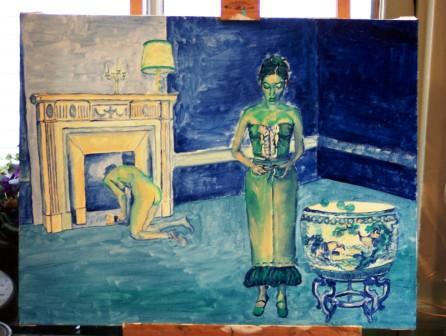

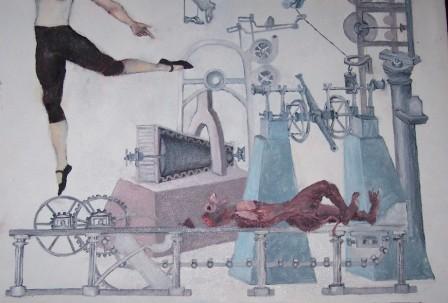 I took two pictures for you today. The first is my painting before work on it. The second is my painting after today's work. Painting is very slow, disciplined work. There is no frenzy of creativity here. And frankly, there is very little advancement. I do a little every day and day after day my small efforts add up. Frequently, just like doing the dishes, I must visualize myself painting before I can actually find the energy and willpower to paint. Yes, I look forward to making art. But often I look forward to doing it because when I paint - I prove - that I exist. Again, this illness rots out your brain. I have to scratch and claw for every small task that defines the kind of person I am. It is true that what you do makes the person that you are. If I grow several beautiful, flowering, deep purple African violet plants, does that make me less sick? Yes. Yes it does. I'll have to take a picture of my African violet plants for you. They bring peace, love, and joy into our apartment. And that they live and thrive, this is proof of my control over my illness. God doesn't care if what you do is big or small. He only wants it to be good.
I took two pictures for you today. The first is my painting before work on it. The second is my painting after today's work. Painting is very slow, disciplined work. There is no frenzy of creativity here. And frankly, there is very little advancement. I do a little every day and day after day my small efforts add up. Frequently, just like doing the dishes, I must visualize myself painting before I can actually find the energy and willpower to paint. Yes, I look forward to making art. But often I look forward to doing it because when I paint - I prove - that I exist. Again, this illness rots out your brain. I have to scratch and claw for every small task that defines the kind of person I am. It is true that what you do makes the person that you are. If I grow several beautiful, flowering, deep purple African violet plants, does that make me less sick? Yes. Yes it does. I'll have to take a picture of my African violet plants for you. They bring peace, love, and joy into our apartment. And that they live and thrive, this is proof of my control over my illness. God doesn't care if what you do is big or small. He only wants it to be good.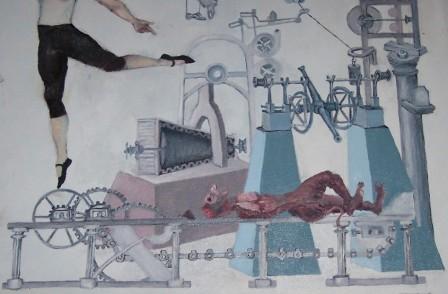 You aren't an anomaly. Probably most people think like you. So, how am I ever going to get you all to walk in my shoes?
You aren't an anomaly. Probably most people think like you. So, how am I ever going to get you all to walk in my shoes?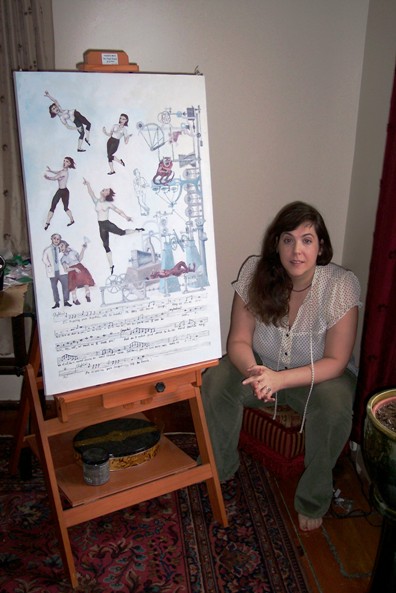


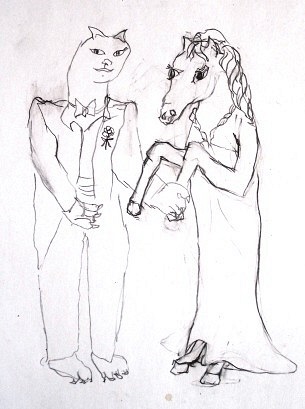 The first sketch for the marriage picture was made just from my imagination and I like it the best. In it I tried to do a rough estimate of my own wedding dress. However, Mike was disappointed that the horse didn't look sexier in her dress. Of course he had no idea he was insulting my own gown. So I went to the library and looked at designer gowns in a Vogue magazine. And at that black tie event there were tuxedos too.
The first sketch for the marriage picture was made just from my imagination and I like it the best. In it I tried to do a rough estimate of my own wedding dress. However, Mike was disappointed that the horse didn't look sexier in her dress. Of course he had no idea he was insulting my own gown. So I went to the library and looked at designer gowns in a Vogue magazine. And at that black tie event there were tuxedos too. Mike never ceases to amaze me what he can teach me about affection. He once warned me, "you can break a kitty-cat's heart" when I left the new cat from the rescue pound in a dog crate for too many days. Logic says the cat is used to being caged, but as it seemed, she knew that she had been rescued and she desperately wanted to live with us. When I ignored her pitiful cries, yes, I was breaking her heart. At the time ignoring a little mewing seemed like the strong thing to do. But after Mike spoke I felt very ashamed about my former "strength". Unable to hear the need in the cat's voice for whatever reason, it really was a weakness of my capacity for love.
Mike never ceases to amaze me what he can teach me about affection. He once warned me, "you can break a kitty-cat's heart" when I left the new cat from the rescue pound in a dog crate for too many days. Logic says the cat is used to being caged, but as it seemed, she knew that she had been rescued and she desperately wanted to live with us. When I ignored her pitiful cries, yes, I was breaking her heart. At the time ignoring a little mewing seemed like the strong thing to do. But after Mike spoke I felt very ashamed about my former "strength". Unable to hear the need in the cat's voice for whatever reason, it really was a weakness of my capacity for love. Mike and I will be printing a small icon of the cat and the horse on our wedding invitations. But the best part is that this image, once it is dry, (because it is made from oil paint and that dries slowly!) will be taken to a giclee printmaker. The thank you presents for all the guests at the wedding will be a 5"1/2 x 7"1/2 silver framed print of, "The Mystical Marriage of the Kindly Cat to the Nobel Horse".
Mike and I will be printing a small icon of the cat and the horse on our wedding invitations. But the best part is that this image, once it is dry, (because it is made from oil paint and that dries slowly!) will be taken to a giclee printmaker. The thank you presents for all the guests at the wedding will be a 5"1/2 x 7"1/2 silver framed print of, "The Mystical Marriage of the Kindly Cat to the Nobel Horse".


 Bill MacPhee is the publisher & creator of "Schizophrenia Digest". It is a high quality magazine designed for people who have schizophrenia.
Bill MacPhee is the publisher & creator of "Schizophrenia Digest". It is a high quality magazine designed for people who have schizophrenia. MacPhee chooses to frequently publish short articles by persons with schizophrenia. It's great fun to see what these writers look like, pictures of them sipping coffee in a New York City bistro or standing in the middle of a stream fly fishing. And then, how I love to read their crisp, clean prose.
MacPhee chooses to frequently publish short articles by persons with schizophrenia. It's great fun to see what these writers look like, pictures of them sipping coffee in a New York City bistro or standing in the middle of a stream fly fishing. And then, how I love to read their crisp, clean prose. 
 Hats off to you Zachary, I can't wait to see what your future brings.
Hats off to you Zachary, I can't wait to see what your future brings.